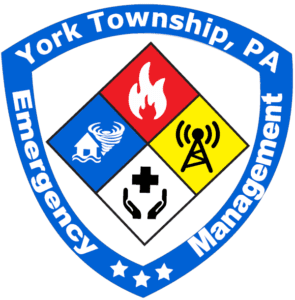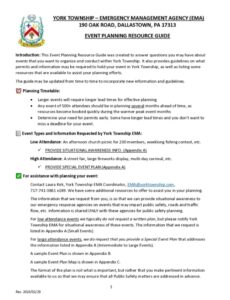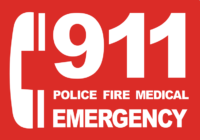E M A

York Township Emergency Management Agency (EMA) provides emergency planning for the residents, businesses and facilities located within York Township. Emergency management is staffed by trained volunteers under the leadership of an appointed Coordinator.
Volunteer Opportunities
Some of the support functions that EMA performs are situational awareness, resource tracking, transportation, mass care and housing, planning, communications, public health, firefighting support / liaison, and general support. All volunteers must pass a PA Criminal Background check and complete required training (free) classes.
Relevant experience for volunteering with EMA includes:
- Retired emergency responder or support (police, fire, EMS, SAR, Red Cross or other relief agency, or EMA)
- Amateur radio license
- LPN or RN
- Mass transit, bus company, or other transportation
- Mass care / temporary housing / sheltering
EMA meets on the third Thursday of each month at 6:30 p.m. Contact the Emergency Management Coordinator if you want to be our guest at a regular meeting.
If you are considering organizing a Special Event in York Township, there are many considerations that should go into your planning and preparing for the event. These include such factors as:
- Do I need a permit?
- Can I get permission to close our road?
- Where can I hold my event?
- What kind of written plan should I prepare?
We have created an Event Planning Resource Guide to help you with planning your event. Click here to download a brief guide that addresses the topics above (and more).

These links will show you the current weather conditions as measured by our Davis WeatherLink weather station at the municipal campus.
⛅ For Current Weather Conditions – York Township Admin Bldg (weatherlink.com)
📈 For Full Weather Station Information, including historical observations – York Township Admin Bldg
York Township EMA is on social media!
Follow us on Facebook at York Township EMA | Facebook
We are also on NextDoor. You must live within York Township to receive our posts on your Nextdoor feed.
![]()
York Township has been StormReady certified since 2010. We received a 4-year renewal in September, 2023. To receive StormReady certification, a community must:
- Establish a 24-hour warning point and emergency operations center
- Have more than one way to receive severe weather warnings and forecasts and to alert the public
- Create a system that monitors weather conditions locally
- Promote the importance of public readiness through community seminars
- Develop a formal hazardous weather plan, which includes training severe weather spotters and holding emergency exercises.

York Township EMA periodically hosts an amateur radio Technician Class licensing class. The session is led by an experienced amateur radio operator and serves as a “prep session” to pass the FCC license test. When a class is scheduled, we will post a link here to our Recreation Dept. web page where you can sign up for the class.![]()
Preparedness, Mitigation, and Safety Tips
Select a tab below to view more information on the topic.
Pandemic. Power loss. Boil water advisory. Cyber attacks. It might seem that danger lies around every turn, and that the task of preparing for all the kinds of bad things that might happen is a daunting prospect. This is where we can benefit from reframing the task not as “PREPARING FOR EVERYTHING!!!” … but as taking some simple steps that can make us better prepared for those bad things. Here is a card that you can save or print out that lists some of the most basic steps that will make you more resilient to the threats of emergencies and disasters. Click here.
Summer will be here soon, and as we journey outdoors to enjoy the season, we need to take a moment to think about how we can all be more fire safe at home and during recreation activities.
- Summer is the season of cookouts; grills should be checked for rust, insects, spiders, grease, and other debris before use.
- Worn gas hoses should be replaced.
- Never grill indoors, in a garage, breezeway, or carport. Grills should only be used 10 feet away from your house or any building.
- Likewise, firepits should be properly maintained and operated away from dead leaves and other flammable debris.
The American Red Cross has some great home fire safety tips here.
If you become dependent upon electricity-powered medical devices at home, please take the following planning and preparedness steps:
- Complete a Special Needs Registry form for York County. This puts your information into the 911 System so that dispatchers can inform first responders of any access or functional needs or medical equipment dependencies. Also, if there are any emergency / disaster situations that occur in York Township, EMA can contact you with important information or, when possible, status checks. There is an online form located on the York County Office of Emergency Management web site. Navigate as follows: To YorkCountyPA.gov > Emergency Services > Emergency Management > York County Special Needs Registry. On this page, you can complete the online form to be included on the registry. Please be aware that any information provided is treated confidentially, and that no specific medical diagnosis information is requested.
- Contact your electricity provider (in York Township, this is MetEd). Tell the representative that you want to request a “Critical Care Form.” The phone support person should be familiar with this form. It must be returned within 10 days of receipt. The form requires information and certification by the physician who has ordered the home medical equipment. Only certain equipment qualifies – be sure you verify with the MetEd phone representative whether your equipment qualifies. MetEd does not guarantee that your home will receive power 24x7x365, but people who sign up will receive priority restoration. Contact the regular customer service number that is listed on your MetEd bill for information on signing up for Critical Care priority restoration.
- Because of the possibility of a lapse in electricity restoration, residents should plan and prepare to have a backup source of power for interim power needs. Consult your medical equipment provider for information on power needs and recommendations for your specific equipment.
All Pennsylvania counties have text-to-911 capabilities.
Our best advice is to call if you can, but text if you can't. Calling provides background sounds and context clues to aid operators and emergency responders.
Texting 911 is ideal if:
- The caller is deaf or hard of hearing
- The caller has a speech disability
- It isn't safe to call 911
- The caller is having a medical emergency and cannot talk on the phone
Texting 911 is as simple as texting a friend. Type 911 in the To field and explain what is happening in your text. Include your location.
While all wireless phones can call 911, texting 911 requires a text or data plan.
Important Details
- A text or data plan is required to place a text to 911.
- Text-to-911 conversations cannot include more than one person. Do not send your emergency text to anyone other than 911.
- Do not use abbreviations or emojis.
- Voice calls are real-time communication. Text-to-911 is not. As with all text messages, texts to 911 may take longer to receive, can get out of order, or might not be received at all.
- Location information will be limited to the cell tower that your phone is communicating through. A 911 telecommunicator won't automatically know where you are.
As you prepare for emergencies, make sure you have a plan for Fluffy and Fido, too. If sudden emergencies or storms arise, evacuation or sheltering will be less stressful for you and your family, including your pets if you have a plan in place.
You may need to evacuate quickly, so having all the pet supplies you need and a safe place for your pets to ride out the storm will make them more comfortable. Talking with your vet or friends who have pets can give you some ideas and advice on how to plan for these emergencies.
Here are some tips to keep your furry friends safe:
Have an evacuation plan
Many public shelters and hotels do not allow pets inside, so plan ahead.
- Know a safe place where you can take your pets before disasters and emergencies happen.
- Plan with neighbors, friends or relatives to make sure that someone is available to care for or evacuate your pets if you are unable to do so.
- Contact your local emergency management office, animal shelter, or animal control office if you’re unsure how to take care of your pet during an emergency (contact info. at top of right column).
- Have your pets microchipped in case they get lost.
Make emergency kits for your pet
Think first about the basics for survival, such as food and water. Have two kits: a larger one if you are sheltering in place and a lightweight, smaller version if you need to evacuate. Review your kits regularly to ensure that their contents, especially foods and medicines, are fresh.
These are some items you may want to include:
- Several days’ supply of food in an airtight, waterproof container.
- Water and bowl with several days’ supply of water.
- Medicines your pet takes regularly.
- Collar with ID tag and a harness or leash.
- Crate or sturdy carrier for each pet.
- Grooming items.
- Sanitation needs, such as litter and litter box, newspapers, paper towels, and plastic trash bags.
- A picture of you and your pet together. This will help you document ownership and allow others to assist you in identifying your pet.
- Favorite toys and bedding that can reduce stress for your pet.
- For caged pets such as hamsters, a small soda bottle with frozen water or a solid container with ice placed on one side of the cage and replaced as needed can help keeping them cool.
Visit www.ready.gov/pets to learn more about preparing your pets for disasters or emergencies.
Contact EMA Coordinator
196 Oak Road
Dallastown, PA 17313
Phone: (717) 741-3861 x189
Email: Online Form


